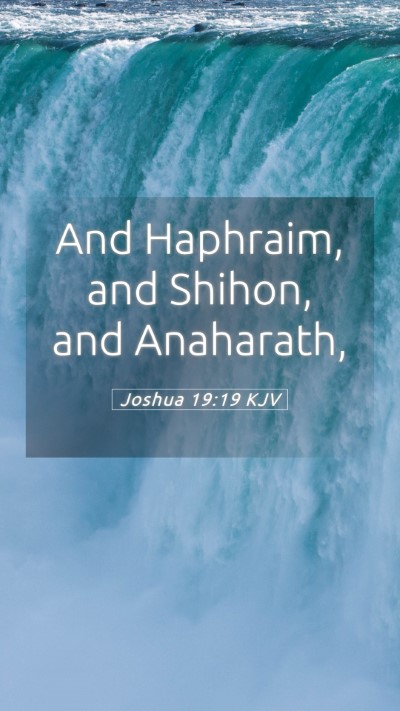Bible Verse Meaning and Interpretation for Joshua 19:19
Bible Verse: "This is the inheritance of the tribe of the children of Simeon according to their families: the cities to be distributed to the children of Simeon were these..." (Joshua 19:19)
Joshua 19:19 describes the allocation of territory to the tribe of Simeon, highlighting important themes in the process of inheriting land as prescribed in the covenant made by God with the Israelites. This verse is part of a larger narrative detailing the distribution of the Promised Land among the twelve tribes of Israel.
Key Insights from Public Domain Commentaries
-
Matthew Henry's Commentary:
Henry emphasizes the significance of inheritance, noting that each tribe received their portion according to God’s sovereign will. He highlights that although Simeon’s inheritance was within the larger territory of Judah, this represents both a fulfillment of God’s promise and a reminder of the consequences of disobedience that led to a diminished portion for Simeon. The determination of boundaries illustrates the importance of God’s providence in the lives of His people.
-
Albert Barnes' Commentary:
Barnes points out that the cities mentioned were crucial for the social and religious life of the Israelites. Their allocation signifies the recognition of Simeon's place among the tribes, despite their smaller number and diminished stature due to past failures. The distribution process is framed in a way that displays the divine order and fairness in God’s plan of inheritance for His people.
-
Adam Clarke's Commentary:
Clarke provides insight into the historical context of Simeon's inheritance, explaining how it was partially overshadowed by Judah's larger territory. He notes that despite this, Simeon still holds an important role, suggesting that this reflects God’s broader providential plan, where even lesser tribes have a place in His unfolding story. Clarke emphasizes the spiritual implications of this allocation, drawing connections to God’s continued guidance and sustenance for His people despite their shortcomings.
Thematic Exegesis
The distribution of land among the tribes also reveals broader themes within Scripture such as:
- God's Promise: The allocation serves as a tangible reminder of God's faithfulness to His covenant promises.
- Community and Unity: Each tribe's inheritance contributes to the overall unity and identity of Israel as a nation Chosen by God.
- Divine Providence: The details concerning inheritance highlight God's providential care, ensuring that even tribes like Simeon have a legacy and a place among God’s people.
Application of Joshua 19:19
This verse provides several important takeaways for contemporary believers:
- Recognizing God's Guidance: Just as God directed the allocation of land to His people, believers are encouraged to seek His guidance in their own lives, recognizing His hand in their journeys.
- Valuing Community: The importance of each community within the larger body of Christ illustrates the value placed on every individual and their contribution to the whole.
- Trusting God's Plan: Even when circumstances seem diminished—much like Simeon’s inheritance—believers are reminded to trust in God’s perfect plan and provision.
Cross References
This verse can be compared and related to the following biblical passages:
- Genesis 49:5-7: Prophetic blessings concerning Simeon and Levi, highlighting their roles and future inheritance.
- Joshua 15:20-32: The broader context of Judah's inheritance and the relationship between the tribes.
- Numbers 26:12-14: A census of the tribes, showing the population and standing of Simeon.
Conclusion
In summary, Joshua 19:19 is not just a mundane record of land distribution; it echoes themes of God's faithfulness, the significance of community, and the unfolding of His divine plan. Such an understanding can be applied to daily life, encouraging believers to reflect on their own paths and God's provision for them.
For those engaged in Bible study or seeking Bible verse meanings, this verse serves as an excellent example to study how God works within histories and individuals, with lessons that resonate across time.


